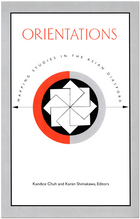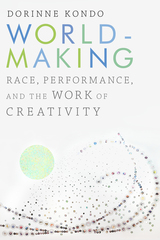2 books about Kondo, Dorinne

Orientations
Mapping Studies in the Asian Diaspora
Kandice Chuh and Karen Shimakawa, eds.
Duke University Press, 2001
Asian and Asian American studies emerged, respectively, from Cold War and social protest ideologies. Yet, in the context of contemporary globalization, can these ideological distinctions remain in place? Suggesting new directions for studies of the Asian diaspora, the prominent scholars who contribute to this volume raise important questions about the genealogies of these fields, their mutual imbrication, and their relationship to other disciplinary formations, including American and ethnic studies.
With its recurrent themes of transnationalism, globalization, and postcoloniality, Orientations considers various embodiments of the Asian diaspora, including a rumination on minority discourses and performance studies, and a historical look at the journal Amerasia. Exploring the translation of knowledge from one community to another, other contributions consider such issues as Filipino immigrants’ strategies for enacting Asian American subjectivity and the link between area studies and the journal Subaltern Studies. In a section that focuses on how disciplines—or borders—form, one essay discusses “orientalist melancholy,” while another focuses on the construction of the Asian American persona during the Cold War. Other topics in the volume include the role Asian immigrants play in U.S. racial politics, Japanese American identity in postwar Japan, Asian American theater, and the effects of Asian and Asian American studies on constructions of American identity.
With its recurrent themes of transnationalism, globalization, and postcoloniality, Orientations considers various embodiments of the Asian diaspora, including a rumination on minority discourses and performance studies, and a historical look at the journal Amerasia. Exploring the translation of knowledge from one community to another, other contributions consider such issues as Filipino immigrants’ strategies for enacting Asian American subjectivity and the link between area studies and the journal Subaltern Studies. In a section that focuses on how disciplines—or borders—form, one essay discusses “orientalist melancholy,” while another focuses on the construction of the Asian American persona during the Cold War. Other topics in the volume include the role Asian immigrants play in U.S. racial politics, Japanese American identity in postwar Japan, Asian American theater, and the effects of Asian and Asian American studies on constructions of American identity.
Contributors. Dipesh Chakrabarty, Kuan-Hsing Chen, Rey Chow, Kandice Chuh, Sharon Hom, Yoshikuni Igarashi, Dorinne Kondo, Russell Leong, George Lipsitz, Lisa Lowe, Martin F. Manalansan IV, David Palumbo-Liu, R. Radhakrishnan, Karen Shimakawa, Sau-ling C. Wong
[more]

Worldmaking
Race, Performance, and the Work of Creativity
Dorinne Kondo
Duke University Press, 2018
In this bold, innovative work, Dorinne Kondo theorizes the racialized structures of inequality that pervade theater and the arts. Grounded in twenty years of fieldwork as dramaturg and playwright, Kondo mobilizes critical race studies, affect theory, psychoanalysis, and dramatic writing to trenchantly analyze theater's work of creativity as theory: acting, writing, dramaturgy. Race-making occurs backstage in the creative process and through economic forces, institutional hierarchies, hiring practices, ideologies of artistic transcendence, and aesthetic form. For audiences, the arts produce racial affect--structurally over-determined ways affect can enhance or diminish life. Upending genre through scholarly interpretation, vivid vignettes, and Kondo's original play, Worldmaking journeys from an initial romance with theater that is shattered by encounters with racism, toward what Kondo calls reparative creativity in the work of minoritarian artists Anna Deavere Smith, David Henry Hwang, and the author herself. Worldmaking performs the potential for the arts to remake worlds, from theater worlds to psychic worlds to worldmaking visions for social transformation.
[more]
READERS
Browse our collection.
PUBLISHERS
See BiblioVault's publisher services.
STUDENT SERVICES
Files for college accessibility offices.
UChicago Accessibility Resources
home | accessibility | search | about | contact us
BiblioVault ® 2001 - 2024
The University of Chicago Press









